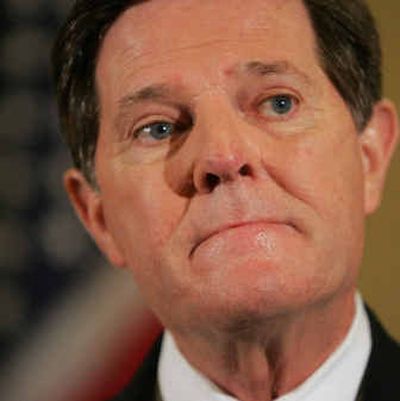Remarks ‘inartful,’ DeLay admits

WASHINGTON – House Majority Leader Tom DeLay, increasingly under fire for what critics describe as ethical lapses and political overreach, offered a rare apology Wednesday for what he said were “inartful” remarks criticizing federal judges.
DeLay’s earlier comments during the Terri Schiavo case, in which he suggested that judges should “answer for their behavior,” set off a firestorm of criticism, suggesting that he was inciting violence against judges.
DeLay’s troubles have led to calls from Democrats for him to step down from his leadership position and suggestions from some Republicans that he make a full accounting of his actions.
In his weekly meeting with reporters, DeLay, a Texas Republican, conceded that his rhetoric had been overheated after the death of Schiavo, the brain-damaged Florida woman whose parents fought unsuccessfully in the federal courts to keep her feeding tube attached.
“Sometimes I get a little more passionate, and particularly during the moment, and the day that Terri Schiavo was starved to death, emotions were flowing,” DeLay said. “I probably said – I did, I didn’t probably – I said something in an inartful way, and I shouldn’t have said it that way, and I apologize for saying it that way.”
On March 31, the day that Schiavo died, DeLay denounced federal judges who failed to halt her death as “arrogant, out-of-control (and) unaccountable.”
“The time will come for the men responsible for this to answer for their behavior, but not today,” Delay said. “Today we grieve, we pray, and we hope to God this fate never befalls another.”
DeLay continued to criticize federal judges last week, telling a conference of conservative activists that recent court decisions “are not examples of a mature society, but of a judiciary run amok.”
“The response of the legislative branch has mostly been to complain,” DeLay continued. “There is another way, ladies and gentlemen, and that is to reassert our constitutional authority over the courts.”
DeLay is facing criticism on two fronts – first, for being too partisan and inappropriately fomenting anger at federal judges, and second, for alleged ethical improprieties, including accepting foreign travel from lobbyists and putting family members on his campaign payroll.
DeLay is the No. 2 leader of the House of Representatives, a position to which he was elected by his fellow Republicans, who have stood with him even though he has been rebuked three times by the House Ethics Committee. Over the weekend, two prominent Republicans called for DeLay to respond to the charges.
So far, DeLay’s strategy has been to try to deflect the criticism and to present it as an attempt to undercut Republican proposals. Wednesday, he portrayed the ethics questions as part of a Democratic campaign against him and did not answer them.
“I’m not here to discuss the Democrats’ agenda. I’m here to discuss our agenda,” DeLay insisted.
Republicans say a critical factor in whether DeLay rides out the storm is whether he retains the support of President Bush.
White House spokesman Scott McClellan said DeLay has the president’s confidence.
“We have worked with him on a number of important priorities, as well as other congressional leaders, and the president intends to continue working with congressional leaders, like Speaker (J. Dennis) Hastert and Leader DeLay, to get things done for the American people,” McClellan said.
Democrats worked to raise the heat on DeLay and to connect him rhetorically to the efforts of Senate Republicans to limit Democrats’ ability to filibuster judicial nominations. Both moves, Democratic leaders argued, were examples of what they called “an arrogance and abuse of power” by Republicans.
“We need responsible Republicans to rise up against the radical Republicans who are trying to change our institution,” said Senate Minority Leader Harry Reid, D-Nev. “We need to get back to the business of the people.”